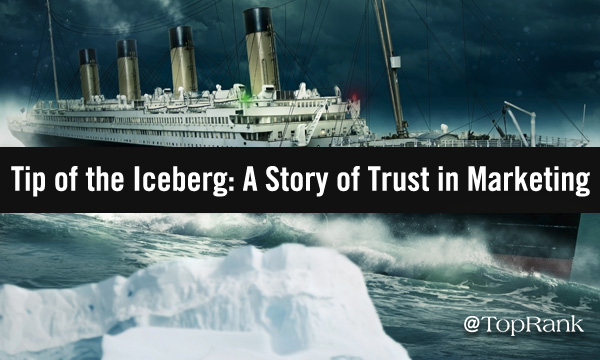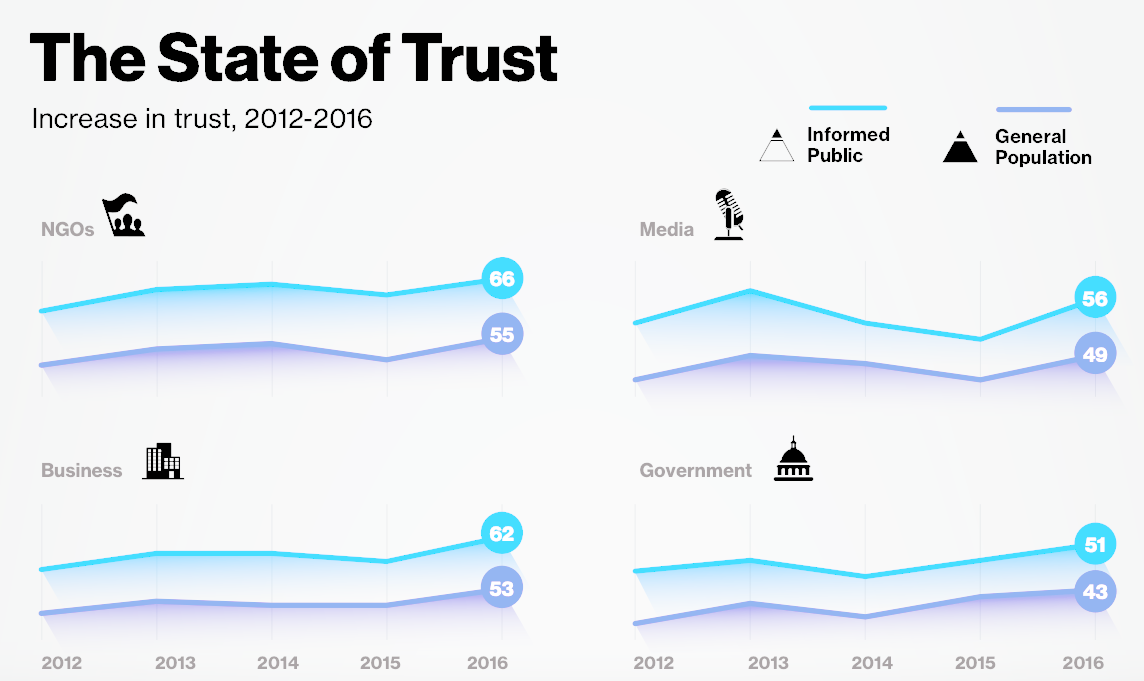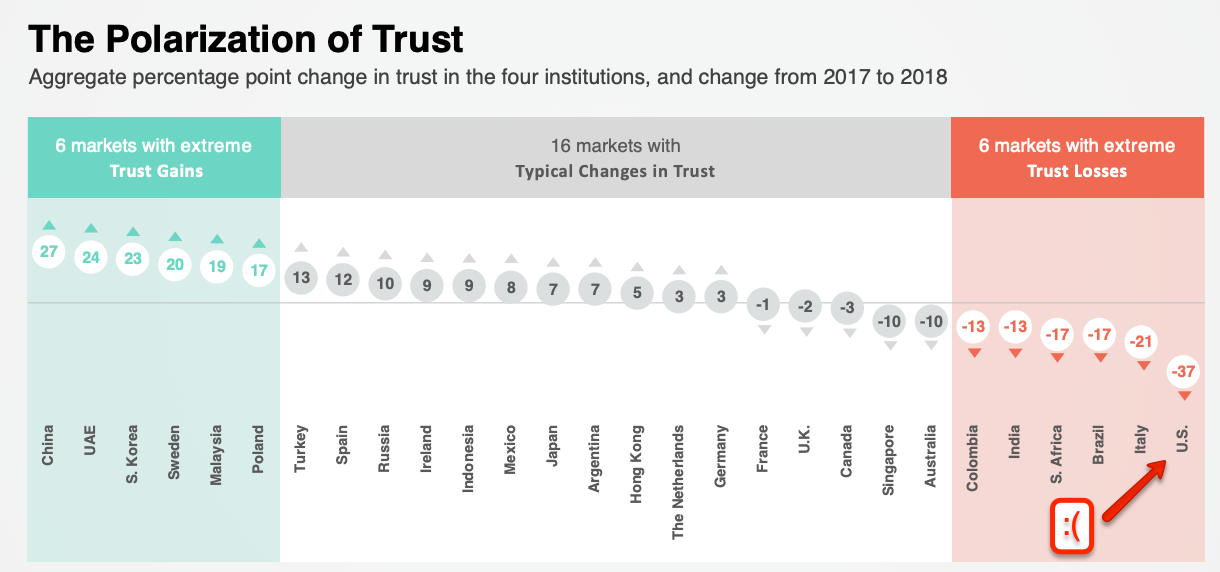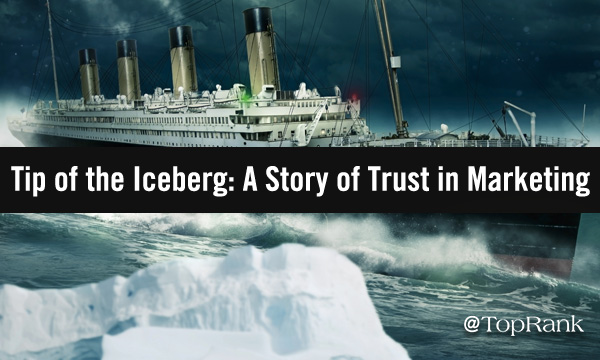The scene described above is perhaps its most famous — the linchpin in a love story sparked by deep, genuine trust that materialized almost out nowhere. Strap on your lifejacket and prepare for a journey through these choppy waters… By the Numbers: The State of Trust in Marketing At the outset of 2016, trust toward all four institutions measured by Edelman Trust Barometer reached their highest levels since the Great Recession, with businesses seeing the largest spike. 63% of people agree with this statement: “A good reputation may get me to try a product—but unless I come to trust the company behind the product I will soon stop buying it, regardless of its reputation.” (Edelman) Oh, and: 68% of adults in the U.S. say that trust in a brand has “a great deal” or “a lot” of influence on their decision when making a big purchase. Edelman’s 2018 report found that company content is twice as trusted after a customer-brand relationship has been formed. Well… 65% of business buyers say they’re likely to switch brands if vendors don’t make an effort to personalize communications to their company. Whatever the approach, customers clearly want it. Personalized marketing is the byproduct of turning customer data into useful insights. 79% of consumers will leave a brand if their personal data is used without their knowledge. Content marketing strategies founded on personalization, with storytelling, authenticity, and transparency as cornerstones, will be primed to stand the test of time in an age of digital disorientation. Want to read more from me on trust and transparency in marketing?

“Step up on the railing. Hold on, hold on. Keep your eyes closed.”
Jack is holding Rose around her waist, cautiously lifting her up to the Titanic’s bow.
“Do you trust me?”
He was a stranger up until days earlier, but still, her response is almost instantaneous.
“I trust you.”
Moments later, Rose opens her eyes and she’s flying, arms outstretched as the mighty liner propels her forward. She and Jack hold hands; they kiss. Celine Dion’s music wafts in the background. Teenage boys in the theater start gagging, while romantic types swoon.
There’s a good chance you lived through this very experience. James Cameron’s 1997 cinematic landmark Titanic was an unprecedented hit, holding the title as highest-grossing film of all time for 14 years. The scene described above is perhaps its most famous — the linchpin in a love story sparked by deep, genuine trust that materialized almost out nowhere.
When I say, “Everyone and their mom saw this movie,” I mean it a bit too literally because I actually saw it with my mom, as a 12-year-old, and it was… awkward.
With that embarrassing story out of the way (I swear there’s a reason I mentioned it, and we’ll get back to it later), let’s move on to one you might actually care about: The state of trust in marketing.
Strap on your lifejacket and prepare for a journey through these choppy waters…
By the Numbers: The State of Trust in Marketing
At the outset of 2016, trust toward all four institutions measured by Edelman Trust Barometer reached their highest levels since the Great Recession, with businesses seeing the largest spike.

Things looked good. Confidence was high. We were all cruising merrily along. Then, we hit the iceberg that was 2016. You might remember that year not-so-fondly, for any number of reasons.
The following year, Edelman declared that “trust is in crisis around the world,” citing an unprecedented drop across all four institutions. The 2018 research revealed “a world of seemingly stagnant distrust,” with no rebound to be seen. Things weren’t merely stagnating everywhere, though…
In 2018, only 48% of people in the United States said they trust businesses, down from 58% in 2017. (Edelman)

This was a point where people were frantically piling into lifeboats. I think I just saw Billy Zane kick a little kid off one. What a jerk.
Anyway, this is a problem.
[Side note: If you’re noticing a lot of Edelman citations thus far, it’s because their Trust Barometer is such a valuable resource for the topic, and offers a consistent baseline to show the progression of trust. But there are plenty of other sources to come.]
63% of people agree with this statement: “A good reputation may get me to try a product—but unless I come to trust the company behind the product I will soon stop buying it, regardless of its reputation.” (Edelman)
Oh, and:
68% of adults in the U.S. say that trust in a brand has “a great deal” or “a lot” of influence on their decision when making a big purchase. (SurveyMonkey)
I’m not exactly sure what the difference is between “a great deal” and “a lot,” but alas…
We’ve reached an era where people at large are digitally adept and savvy. They know they have a world of options at their literal fingertips, and can thusly hold brands to the highest of standards. Trust strikes a deep emotional chord.
“The digital era has fundamentally shifted assumptions for how individuals will do business and engage with companies,” Kevin Cochrane, Chief Marketing Officer at SAP, wrote at Harvard Business Review last year. “Once trust has been lost, it’s nearly impossible for brands to rebuild sustainable, honest relationships with their customers.”
In other words: once the ship has sunk, it…

COMMENTS